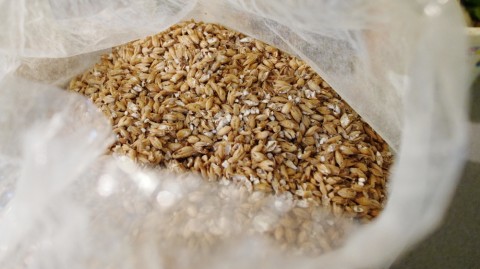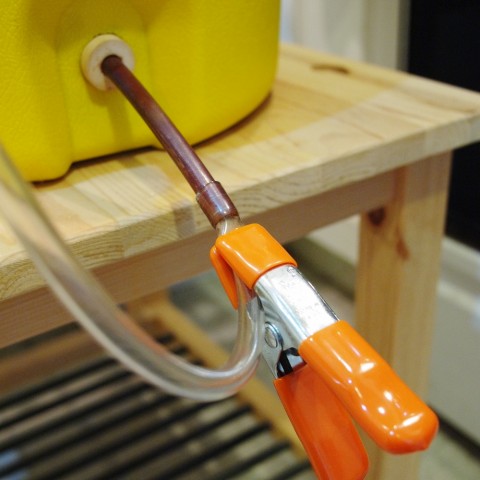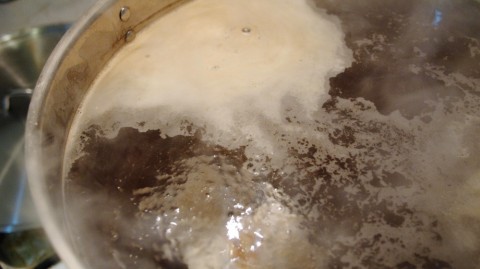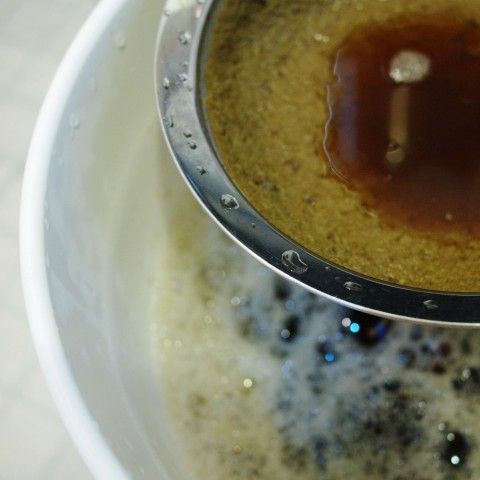** Update: The answer, dear friends, to the question of whether my yeast problems would kill this beer, is a big, resounding yes. I bought some additional yeast this morning, thinking that I would re-pitch. And when I opened my fermentation vessel, what I found was kind of horrifying: colorful, clearly bacterial colonies floating on the surface, and a smell like curdled milk (be glad this blog isn’t scratch-and-sniff) that is unmatched by anything I’ve ever smelled in this house before. Which is saying a lot. Because our cleaning habits are — you know — spotty at best.
But as I said in the original post, whether it ended up fermenting or not, I learned quite a bit from this beer. And the tentative plan right now is to reproduce my (otherwise) good results this upcoming weekend with … wait for it … Northern Brown Ale II: The Wrath of Khan.
By which I mean to say, of course: Dear Spoiled Batch — “From hell’s heart, I strike at thee!”
* * *
Imagine, for a moment, that it’s the twenty-fourth century and you’re on Deep Space Nine. Miles O’Brien and Julian Bashir saunter into Quark’s. They’re joking and laughing, preparing for a long night of R&R that might involve some time in the holo-suites fighting the Battle of Britain, some darts, and maybe a hardy round or two of singing Jerusalem. O’Brien claps Bashir on the back (they can’t kiss because, after all, it’s Star Trek) and then, still chuckling, he bellies up to the bar.
Seeing him, Quark asks: “What’ll it be, Chief?”
“Drinks,” Miles answers, “for myself and the good Doctor.” He pauses a beat, and then says, “Two Synthales, please.”
Synthale?!
Suddenly, I’m out of the story. I love Deep Space Nine because, more than other Trek, the people seem real. They have interests that aren’t all about self improvement. They have close friends and acquaintances, station-board, and people with whom they definitely do not get along. They laugh like us. They love like us. But really? They drink a malt-ish beverage that sounds like it was pissed out of a factory that produces cleaning supplies on the side? Miles, fine Irishman that he is, might as well have ordered a Zima.
The issue, you see, is that beer is important. Beer isn’t just another drink like lemonade or prune juice. It is about identity, about personal and collective history, about — and this is a good Star Trek theme — what it means to be human.
Along with bread, beer is our oldest consumable. The Egyptians had it. The Sumerians had it. There is evidence that our neolithic ancestors had it, and maybe their ancestors before them. It was the beverage of choice for English Earls and Viking marauders (for whom mead was only a sometimes drink). Laborers from the Middle Ages through the nineteenth century drank it three meals a day to stave off hunger and save themselves from dysentery. Alehouses drove the formation of civil society in England, and colonial taverns became the spark of the American revolution.
And it is definitive, to a certain degree, of national culture. What is more German that a Munich biergarten, where visitors drink dark, malty lagers? What’s more English than a pub serving hand-pulled pints of bitter, or porter, or mild? What’s more Irish than a Guinness? More American that a Budweiser at a football game? In a beer, you have a mix of personal taste, heritage, national and regional loyalties that a synthale, such as it is, cannot reproduce.
Because beer is important.
Which is a long way of saying that I brewed on Sunday — a Northern English Brown Ale — and I’m really excited about it. It occurs to me that there is really no good way of talking about brewing procedure on this blog. If you already know how to do it, anything I could say would be uninformative. And if you don’t, you’d be better served by a good book on the subject.
So I will skip that part, and tell you instead that the reason I’m so excited about this batch is that (I think that) I’m finally getting the hang of it. The difficult part of making beer is managing to efficiently convert the starches in malted grain into sugars that can be fermented by yeast. And because of some small modifications that I’ve made to my technique, I did that, yesterday, better than I ever have before. In the past, ten pounds of malted barley has yielded for me a beverage that is about 4.5% alcohol. That same ten pounds, using this new method, should yield a beverage that is about 5% alcohol. It doesn’t seem like a big deal or a big jump in the final result. But better efficiency means that I will have to use less grain in the future, which means lower costs and less waste. For five-gallon beer batches, whatever. But it is a point of pride for me to know that I am getting to the point where I can do this as well as anybody out there.
As to the final product — the brown ale itself — I am actually a little bit nervous about how it will turn out. There were some problems with my yeast that may require a second addition, which may mean a beer filled with unfortunate off-flavors. But while I do enjoy a warm pint of English ale, the process, not the product, has really always been the point for me. The two things I like most about beer are both in the making: 1) the fact depending on how they are prepared, I can use just four basic ingredients — grain, hops, yeast, and water — to make hundreds of brews as different as Pilsner, IPA, and Stout. And 2) the fact that by brewing, I am connecting with that strain of human ingenuity that places me in line with folks going back to before recorded history.
But still, tasty beer is better than the other kind. So I would appreciate it very much (very much) if you would keep your fingers crossed about this one. If it turns out poorly, I will have learned a lot that I consider important to making good beer in the future. But wouldn’t it be better if I were able to contemplate those very important lessons over a nice tall glass of really fine brown ale?
Just sayin’.
Meanwhile, here is the recipe I used, which is a slightly revised version of this one that I posted last month:
5 lbs. Maris Otter Malt
4 lbs. British Mild Malt
1 lbs. Victory Malt
0.33 lbs. British Chocolate Malt
1 oz. Fuggles Hops, boiled for 60 minutes
1 oz. Kent Golding Hops, boiled for 10 minutes
Wyeast Thames Valley Yeast
* * *
Finally, just a technical announcement about the blog. Because of an overflow of spamminess, I have been forced to modify the comments system just a little bit, adding a measure to force you to prove that you’re human before you’re allowed to submit a posting. I apologize for the inconvenience. But the spam-bots were drowning me, and I couldn’t take it anymore.



